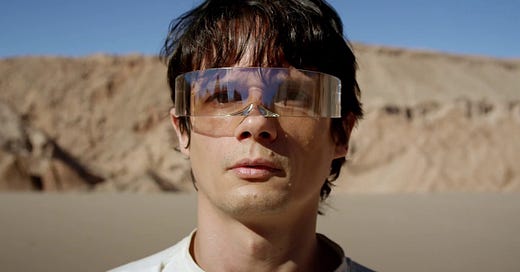It’s not like I have an encyclopedic understanding of Brazilian film, but I do have this suspicion: If you’re going to live in a futuristic dystopia, you want it to be in Brazil. Everywhere else on Earth, you’re going to get grey little people living grey little lives in a dehumanizing cluster of monolithic towers. In Brazil, it may be still be soulless, but it will also be hedonistic as all hell. Everyone will be beautiful – women and men – and sooner or later there will be full-frontal nudity – women and men. The dinners will be sumptuous, the parties lavish, the celebrations energetic. If this is the way our humanity dies, it’ll at least be going out on a high note.
The protagonist of the 2014 Brazilian film Blue Desert – which is now getting a (ahem) “Blu”-ray release – isn’t quite ready to surrender to that fate. Played by Odilon Esteves, Ele (literally “Him”) has grown dissatisfied with the lavish but hollowly cyclical nature of his life. He wanders through various scenarios – a raucous party where the all the guests literally engage in the same conversation; a shower where he strains to find his own reflection in a mirror; a commute on a hyper-space transport where a neighboring passenger issues cryptic “proposals” (that may be referencing the Yoko Ono art book Grapefruit, which co-writer/director Eder Santos claims served as a source of inspiration). He is guided by two guardian spirits: Alma (Maria Luísa Mendonça) a mysterious woman he meets at the party (and whose name translates to “soul,” as the subtitles repeatedly, and pointedly, elaborate), and a philosopher/painter (Chico Díaz) who wanders a nameless desert, spray-painting it blue.
Santos doesn’t go out of his way to indicate which, if any, of these events may be real, and which may be fantasies playing out in Ele’s mind. Given a sequence in which Ele is confined to a bed and having a conversation with a neighbor hooked up to what appears to be monitoring equipment, I’m guessing that some or all of the narrative takes place after Ele has undergone some sort of traumatic event (maybe a crash of that commuter vehicle?). That would provide some context to Santos’ non-linear approach to the narrative, to the repetition of events with minor alterations of detail, and to the moment where Ele switches identities with Alma.
Or I may be imposing too much of a frame upon a film that isn’t asking for it. I look at Blue Desert as a lyrical experience, not in the way the term is typically used, but in how the lyrics of a song may be meant to invoke a feeling, rather than be taken literally. Santos gives us lots of beautiful imagery to capture our hearts, particularly in extended, exultant shots of the desert, and lots of strange settings to spark our imaginations – Ele, apparently some kind of avid gadgeteer, has an apartment peppered wall-to-wall with whirring gizmos. In essence, Blue Desert endeavors to stimulate the audience the way Ele’s muses try to inspire him. The “why” of the film may be elusive, but it leaves an evocative impression, and that may be justification enough.
(BTW: On the topic of full-frontal nudity: No women in this case, but as for Ele, yyyyyyyyep.)





